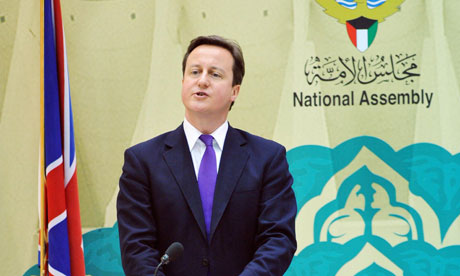David Cameron's Middle East vision sees him retreat from the Bushes
Prime minister's speech in Kuwait dismissed 'realist' school and neocon approaches favoured by former US presidents

Is David Cameron creating his own Third Way on foreign policy, which is neither Bush nor the other Bush?
The prime minister used a speech in Kuwait to outline a vision that rejects the two competing views of foreign policy, symbolised by George Bush Sr and Jr, which have dominated thinking over the past two decades.
In his speech at the national assembly in Kuwait, the prime minister laid to rest Britain's Camel Corps school of diplomacy. The "realist" school, symbolised on the world stage by Bush Sr, held that the west should hold its nose and support despots in the Middle East in the interests of stability.
Cameron dismissed this approach. He said it leads to a prejudice bordering on racism, which believes that Arabs and Muslims cannot manage democracy.
Bush Jr, who famously had a troubled relationship with his father, also reacted against the "realist" thinking by embracing the neocons. They believed the US should not be afraid to spread universal values of democracy around the world, preferably in hostile states such as Iraq.
This approach famously prompted neocons to declare that US troops would be greeted in Iraq with flowers on the streets. Democracy would then flourish.
Cameron rejected this approach too. In his speech he reiterated his phrase of the moment that he is not a "naive neocon" who believes that democracy can be dropped from an aeroplane. The future prime minister caused great offence in the US when he first outlined this approach, which he called liberal conservatism, on the fifth anniversary of 9/11 in 2006. It was a direct rebuke of the Bush Jr approach.
The Cameron speech also marked a reaction against Tony Blair's "liberal interventionism". First outlined in his Chicago speech in 1999, the Blair philosophy said that it was right to challenge sovereign governments if a series of conditions are met.
Cameron's approach is, by contrast, classically Conservative. He says it is right to encourage democracy in the Middle East. But he says this should be done in an evolutionary way in which the "building blocks" of democracy, such as an independent judiciary and free media, are laid in a careful and painstaking process.
The prime minister hopes this approach will help him navigate his way round the Middle East. On the one hand he wants to acknowledge the wave of protests prompted by basic demands for political reform. At the same time Cameron does not want to alienate the leaders of Gulf states where there are huge business opportunities for Britain.


 5:30 AM
5:30 AM
 Wikipedia
Wikipedia

 Posted in:
Posted in: 

0 comments:
Post a Comment